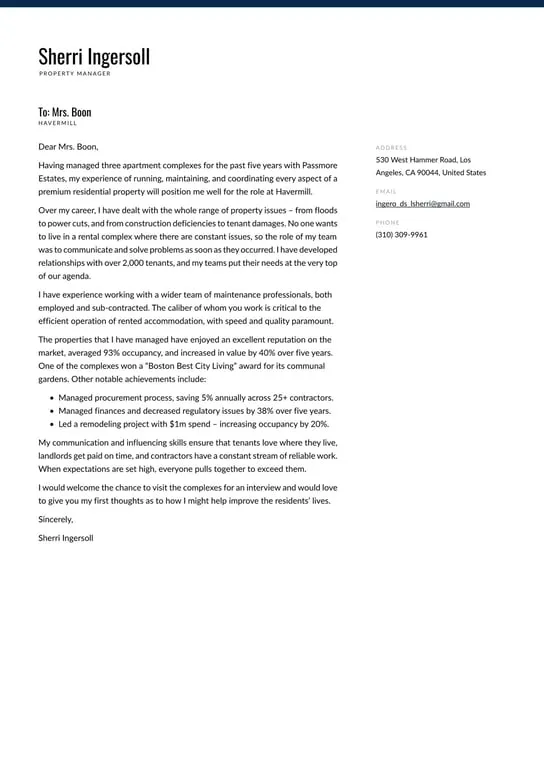What Is a Property Manager Cover Letter
A property manager cover letter is a crucial document that accompanies your resume when applying for property management positions. It serves as your first introduction to a potential employer, providing a platform to showcase your qualifications, skills, and enthusiasm for the role. Unlike a resume, which offers a concise overview of your experience, a cover letter allows you to elaborate on your relevant skills and explain why you are the ideal candidate for the specific position. It’s your opportunity to make a strong first impression and differentiate yourself from other applicants. An effective cover letter demonstrates your understanding of the property management industry and your ability to contribute to the success of the company. Writing a compelling cover letter, especially for those with limited experience, involves highlighting transferable skills, expressing genuine interest, and addressing the needs of the property manager.
Why is a Cover Letter Important
The importance of a cover letter cannot be overstated, particularly in the competitive field of property management. It’s an essential tool for setting yourself apart from other applicants. A well-crafted cover letter allows you to explain any gaps in your experience, emphasize your passion for property management, and express your specific interest in the company and the role. For inexperienced property managers, a cover letter is even more critical. It’s your chance to highlight transferable skills from other fields or roles, such as customer service, organizational abilities, and problem-solving skills. By demonstrating how these skills are applicable to property management, you can convince a hiring manager of your potential. Additionally, a cover letter shows that you’ve taken the time to understand the specific requirements of the job and the needs of the property management company. It’s a direct way to communicate your suitability for the role, beyond what’s listed on your resume, showcasing your personality, communication skills, and genuine interest in the position. A cover letter helps you stand out and increases your chances of securing an interview.
Essential Components of a Property Manager Cover Letter
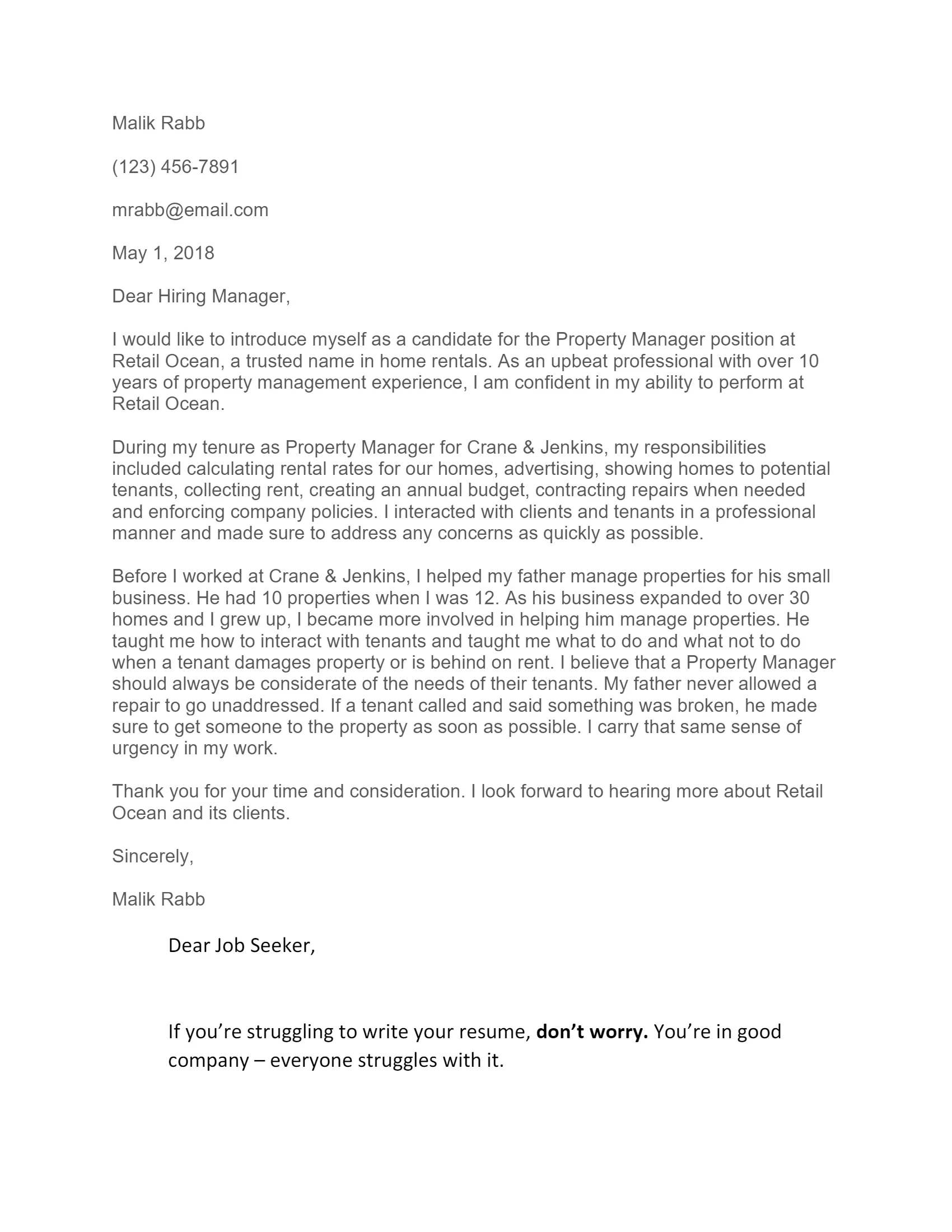
A strong property manager cover letter incorporates several key components to effectively communicate your qualifications and suitability for the role. These elements work together to create a compelling narrative that captures the attention of the hiring manager. Each component must be carefully crafted to convey professionalism, enthusiasm, and relevant skills. Proper formatting and organization of the letter is critical, because it helps ensure that your message is clear, concise, and easy to read. Remember to always tailor your cover letter to each specific job application, including specific skills or experience highlighted in the job description. By doing so, you’ll demonstrate that you’ve taken the time to understand the role and are genuinely interested in the opportunity.
Contact Information
Start your cover letter by including your contact information at the top. This typically includes your full name, address, phone number, and email address. Make sure the contact information is accurate and up-to-date. This section ensures that the hiring manager can easily reach you to schedule an interview or request further information. Presenting your information clearly and professionally demonstrates your attention to detail and sets the tone for the rest of the letter.
Hiring Manager’s Name
Address your cover letter to a specific person if possible. Research the hiring manager’s name, title, and company before you begin writing. Addressing the letter to a specific individual, rather than using a generic greeting, shows that you’ve taken the time to research the company and are genuinely interested in the position. If you are unable to find the name of the hiring manager, use a professional salutation, such as “Dear Hiring Manager,” but always try to find the appropriate person to address the letter to, because it makes it more personal and effective.
Greeting and Introduction
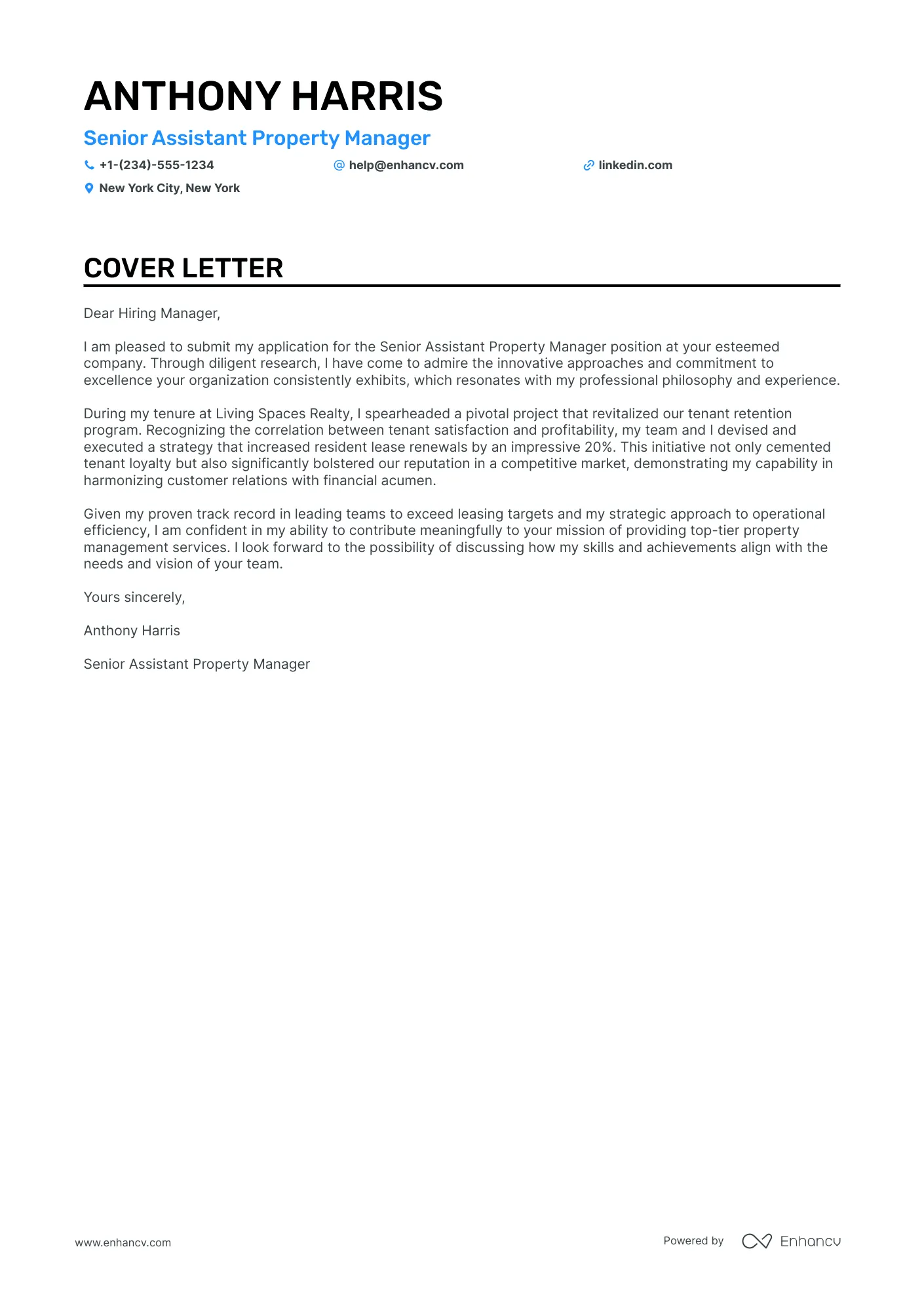
Begin your cover letter with a professional greeting, such as “Dear Mr./Ms. [Last Name],” or “Dear Hiring Manager.” In the introduction, state the position you are applying for and where you saw the job posting. Briefly mention your interest in the role and the company. This section should capture the hiring manager’s attention and entice them to read further. Make a strong opening statement, because it sets the tone for the rest of the letter and highlights your enthusiasm for the opportunity. Mention your enthusiasm for the company and how you learned about the position.
Highlighting Skills and Experience
In the main body of your cover letter, highlight your relevant skills and experience. For those with less direct experience, emphasize transferable skills from previous roles or volunteer work. Provide specific examples of how your skills have led to success in the past. This could include examples of problem-solving, organizational skills, or customer service. Quantify your achievements whenever possible. Use numbers to demonstrate your impact, such as the number of properties you managed or improvements you made. Make sure to align your skills with the job description’s requirements, demonstrating that you possess the qualifications they are looking for. Explain how your skills align with the job description.
Transferable Skills for Inexperienced Managers
For inexperienced property managers, focusing on transferable skills is key. Highlight abilities such as communication, customer service, organizational skills, and problem-solving. Explain how these skills apply to the responsibilities of a property manager. For instance, you could discuss how your customer service experience has prepared you to handle tenant inquiries and resolve conflicts. Alternatively, describe how your organizational skills have allowed you to manage multiple tasks efficiently. Emphasize how you can apply the skills from other areas of work to this role. Demonstrate your ability to learn quickly and adapt to new situations. Provide concrete examples of situations where you successfully utilized these skills, even if they are not directly related to property management, and show their relevance to the job.
Emphasizing Enthusiasm and Interest
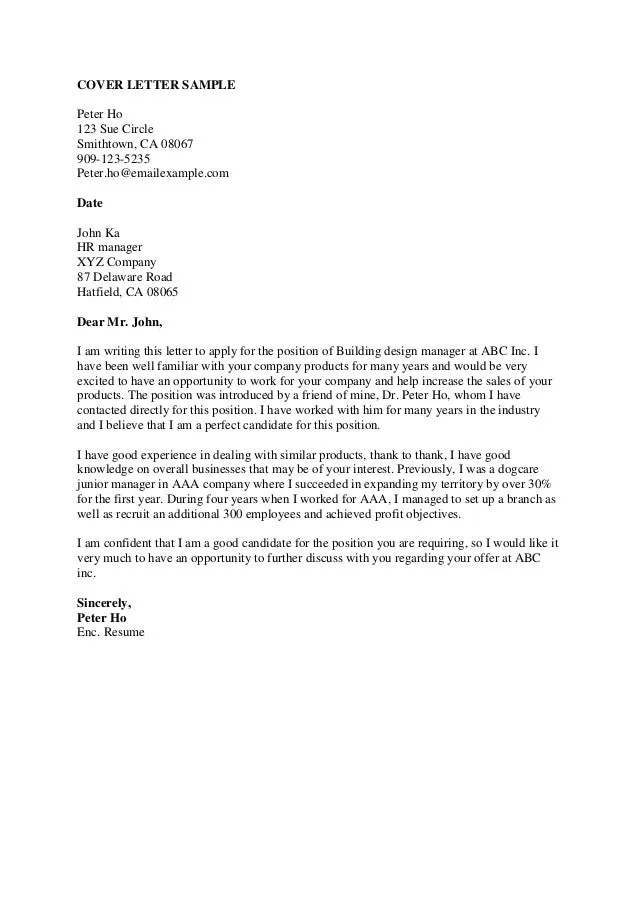
Demonstrate your genuine enthusiasm for the property management role and the company. Explain what interests you about the position and the specific property management company. Research the company to understand its mission, values, and recent achievements. Mention what you admire about the company and how your goals align with theirs. This shows that you have taken the time to learn about the organization and are genuinely interested in contributing to its success. Showing interest is an important attribute of a good employee, and is highly valued by employers.
Addressing the Property Manager’s Needs
Tailor your cover letter to the specific needs of the property manager and the job description. Show that you understand the challenges and responsibilities of the role. Research the specific properties managed by the company and mention your familiarity with them. If the job description emphasizes certain skills, address them directly in your letter. Focus on how you can contribute to the company’s goals and solve their challenges. Provide examples of how you have addressed similar issues in the past, even if they are from different contexts. Show that you can meet the hiring manager’s needs and demonstrate the value you can bring to the company.
Call to Action and Closing
Conclude your cover letter with a call to action, such as requesting an interview. Thank the hiring manager for their time and consideration. Reiterate your interest in the position and your eagerness to discuss your qualifications further. Provide your contact information again for easy reference. Close with a professional sign-off, such as “Sincerely,” or “Best regards.” Proofread your cover letter carefully before sending it, because a mistake in a cover letter can often ruin any chance of getting the job.
Formatting and Proofreading Your Cover Letter
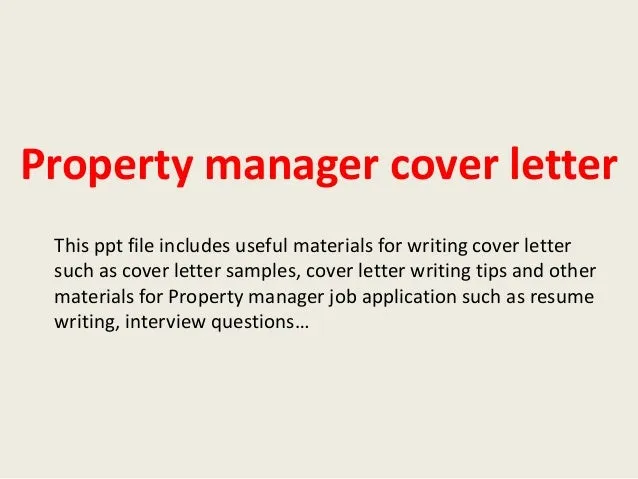
Pay attention to formatting and proofreading to ensure your cover letter is professional and error-free. Use a clean, easy-to-read font, such as Times New Roman or Arial, with a font size between 10 and 12 points. Maintain consistent formatting throughout the document, including margins, spacing, and bullet points. Proofread your cover letter carefully for any grammatical errors, spelling mistakes, or typos. Have someone else review it for you to catch any errors you may have missed. A well-formatted and error-free cover letter demonstrates your attention to detail and professionalism, which is critical in property management.
Cover Letter Examples for Property Managers
Reviewing cover letter examples can provide valuable guidance on how to structure and write your own cover letter. Many online resources offer sample cover letters tailored to various job titles, including property manager positions. Pay close attention to how the examples highlight skills, experience, and enthusiasm for the role. Use these examples as a starting point, but always customize your cover letter to reflect your unique qualifications and the specific requirements of the job. Look at different templates and choose the format that best suits your experience and the tone of the company you’re applying to. Use the examples as a guide to help you craft your own, more effective and persuasive letter.
Addressing Specific Property Types
Property management responsibilities can vary depending on the type of property, so customize your cover letter accordingly. Highlight your experience or interest in specific property types, such as single-family homes, multi-family dwellings, or commercial properties. If you’re applying for a role managing single-family homes, emphasize your understanding of the unique challenges and requirements involved. If the position is for multi-family properties, highlight your experience with tenant relations, lease management, and maintenance coordination. Tailor your cover letter to address the specific needs of each property type.
Single-Family Homes
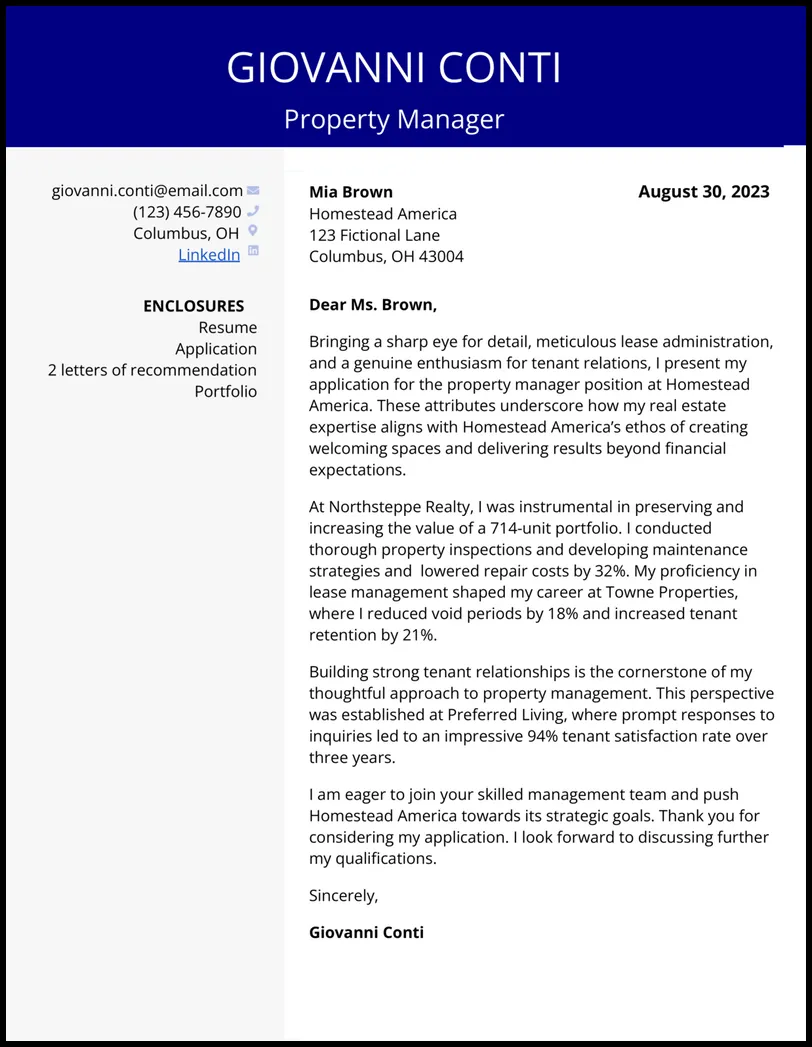
When applying for a property management role for single-family homes, highlight your ability to maintain positive relationships with tenants. Demonstrate your knowledge of local housing laws and regulations. Mention any experience you have with property maintenance, repairs, and inspections. Emphasize your skills in managing tenant communications and addressing their concerns. Your cover letter should convey your understanding of the unique challenges of managing single-family properties, like individual tenant needs, and your ability to provide excellent customer service.
Multi-Family Dwellings
If you’re applying for a multi-family property management position, emphasize your experience in managing multiple tenants and units. Demonstrate your skills in lease administration, rent collection, and property maintenance coordination. Highlight your ability to handle tenant conflicts and maintain a well-managed property. Mention any experience with community management or resident relations. This position requires good communication and coordination to solve issues, and maintain a safe environment.
Commercial Properties
When applying for commercial property management roles, highlight your knowledge of commercial leases, property maintenance, and tenant relations. Mention any experience you have with budgeting, financial reporting, and vendor management. Demonstrate your ability to handle the unique challenges of commercial properties. Showcase your familiarity with local regulations and industry standards. Because of the larger scale, the issues are often more complex, and demand an experienced person to handle the role efficiently.
Key Takeaways and Next Steps
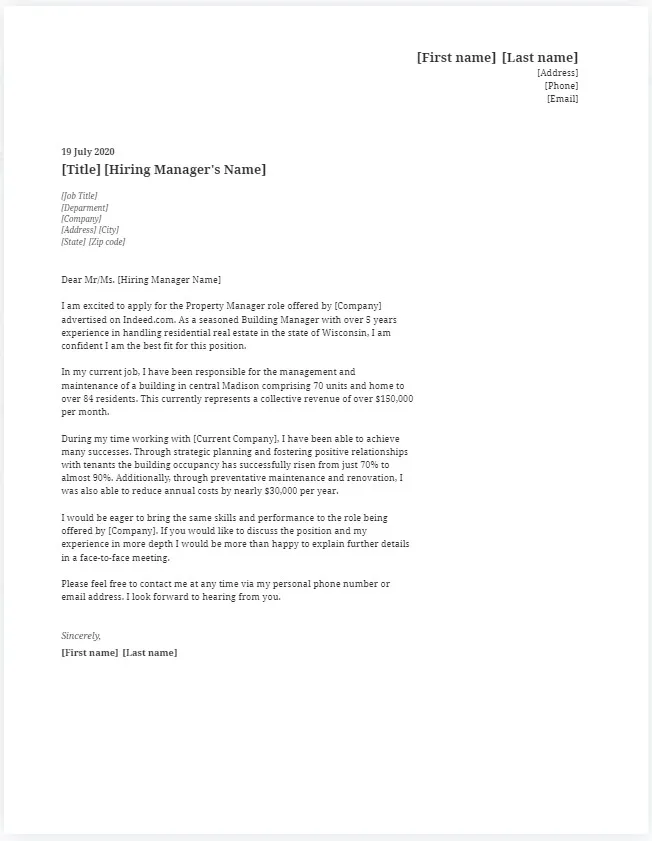
Writing a compelling property manager cover letter is essential for landing an interview. Highlight your skills, experience, and enthusiasm, tailoring your letter to each specific job. For those with limited experience, focus on transferable skills, demonstrate your eagerness to learn, and express your interest in the role. Research the company and address the hiring manager by name to show your attention to detail and genuine interest. Proofread your cover letter carefully and use the examples as a guide. Remember to follow up with the hiring manager after submitting your application. This shows your continued interest and dedication to the position. By following these guidelines, you can create a cover letter that grabs the attention of the hiring manager and increases your chances of securing an interview.
